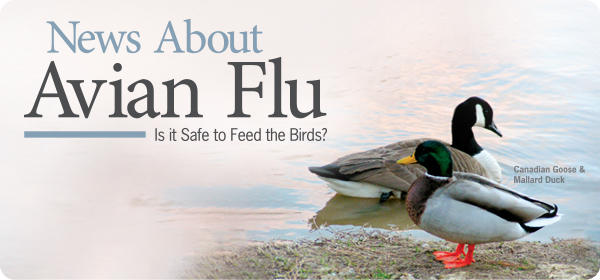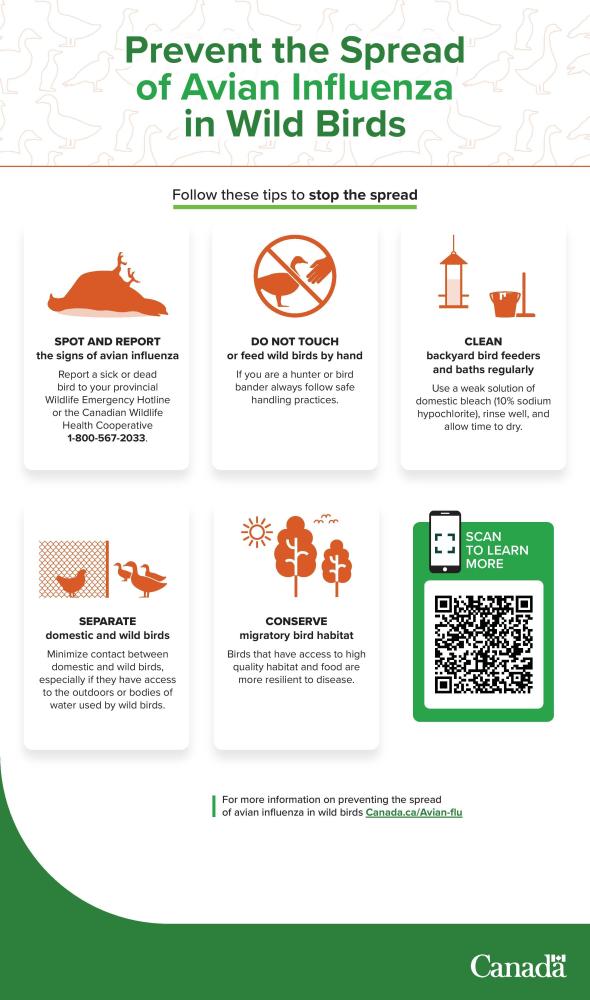Please note: This Avian Influenza outbreak is continuously evolving. We will update our guidance as needed.(Feb 10, 2024)

What You Need to Know
You may have heard about avian influenza (or “bird flu”) and the development of this disease in North America. At this point in time, wildlife and health experts say you may continue feeding the birds. Here are the facts as we know them today.
Recently, on February 9, 2024, KFL&A Public Health Unit confirmed the presence of highly pathogenic avian influenza (AI) in a flock of Canada Geese that were found along the Lake Ontario Park waterfront in Kingston, Ontario.
The current 2021 to 2023 avian influenza in Canada and the US is a highly pathogenic avian influenza (HPAI H5N1) and has been detected in numerous outbreaks across North America. It is a naturally-occurring virus especially prevalent among wild aquatic birds such as ducks, geese and shorebirds and has been shown to affect commercial and backyard poultry with high mortality. Detection of highly pathogenic avian influenza (H5N1) in Canada.
Feeding Wild Birds in Your Backyard
- The use of bird feeders is still safe, but it is recommended they be removed from areas that are open to poultry and other domestic animals. If you care for poultry, prevent contact between wild birds and poultry by removing exterior/outdoor sources of food, water and shelter that attract wild birds.
- The use of bird feeders is unlikely to spread highly pathogenic avian influenza virus, and the risk of an outbreak in wild bird species that frequent feeders is considered low.
- Be sure to clean your backyard bird feeders and baths regularly, at least every two weeks, using a solution of one part household bleach to nine parts water. Ensure that they are well rinsed and dried before re-use. For Birdfeeder Cleaning Tips click here.
- Regular cleaning practices are essential for infection prevention and control, as various other pathogens are known to spread at feeders (e.g., trichomonas, salmonella, and avian pox).
- To minimize the risk of transmission of HPAI virus, do not feed waterfowl, gulls, or other water birds.
Source: Government of Canada - Environment & Natural Resources: canada.ca/avian-flu
Recommendations to Prevent the Spread of Avian Influenza in Wild Birds
To practice the hobby of bird feeding safely and to ensure the birds’ overall health, it is always recommended you clean your bird feeders regularly with a solution of one part bleach and nine parts water. Click HERE for recommendations on how to best keep your feeders clean.
Report Sick or Dead Birds to:
In Ontario, to the Ontario regional centre of the Canadian Wildlife Health Cooperative at (866) 673-4781.
In Québec, to the Ministère des Forêts, de la Faune et des Parcs at 1-877-346-6763.
The Ottawa Valley Wild Bird Care Centre has provided an update with regards to bird admissions. Please visit their website for more information here.
Sources:
Avian Influenza in Wild Birds - Government of Canada
Help Respond to the Avian Influenza Outbreak - Birds Canada
Avian Influenza Virus - Canadian Wildlife Health Cooperative
Avian Influenza Outbreak: Should You Take Down Your Bird Feeders? - The Cornell Lab


